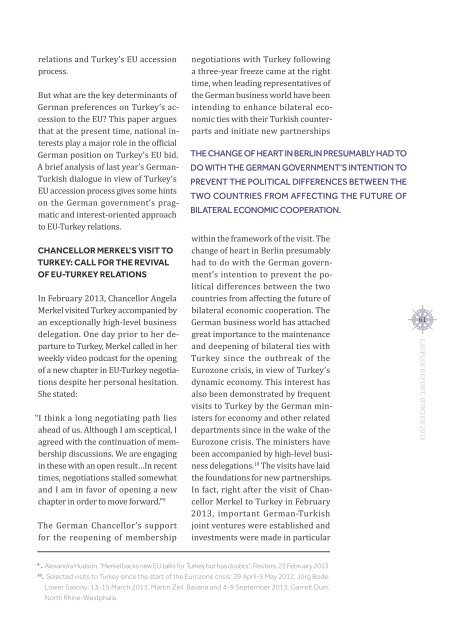Caspian Report - Issue 06 - Winter 2014
Create successful ePaper yourself
Turn your PDF publications into a flip-book with our unique Google optimized e-Paper software.
elations and Turkey’s EU accession<br />
process.<br />
But what are the key determinants of<br />
German preferences on Turkey’s accession<br />
to the EU This paper argues<br />
that at the present time, national interests<br />
play a major role in the official<br />
German position on Turkey’s EU bid.<br />
A brief analysis of last year’s German-<br />
Turkish dialogue in view of Turkey’s<br />
EU accession process gives some hints<br />
on the German government’s pragmatic<br />
and interest-oriented approach<br />
to EU-Turkey relations.<br />
CHANCELLOR MERKEL’S VISIT TO<br />
TURKEY: CALL FOR THE REVIVAL<br />
OF EU-TURKEY RELATIONS<br />
In February 2013, Chancellor Angela<br />
Merkel visited Turkey accompanied by<br />
an exceptionally high-level business<br />
delegation. One day prior to her departure<br />
to Turkey, Merkel called in her<br />
weekly video podcast for the opening<br />
of a new chapter in EU-Turkey negotiations<br />
despite her personal hesitation.<br />
She stated:<br />
“I think a long negotiating path lies<br />
ahead of us. Although I am sceptical, I<br />
agreed with the continuation of membership<br />
discussions. We are engaging<br />
in these with an open result…In recent<br />
times, negotiations stalled somewhat<br />
and I am in favor of opening a new<br />
chapter in order to move forward.” 9<br />
The German Chancellor’s support<br />
for the reopening of membership<br />
negotiations with Turkey following<br />
a three-year freeze came at the right<br />
time, when leading representatives of<br />
the German business world have been<br />
intending to enhance bilateral economic<br />
ties with their Turkish counterparts<br />
and initiate new partnerships<br />
THE CHANGE OF HEART IN BERLIN PRESUMABLY HAD TO<br />
DO WITH THE GERMAN GOVERNMENT’S INTENTION TO<br />
PREVENT THE POLITICAL DIFFERENCES BETWEEN THE<br />
TWO COUNTRIES FROM AFFECTING THE FUTURE OF<br />
BILATERAL ECONOMIC COOPERATION.<br />
within the framework of the visit. The<br />
change of heart in Berlin presumably<br />
had to do with the German government’s<br />
intention to prevent the political<br />
differences between the two<br />
countries from affecting the future of<br />
bilateral economic cooperation. The<br />
German business world has attached<br />
great importance to the maintenance<br />
and deepening of bilateral ties with<br />
Turkey since the outbreak of the<br />
Eurozone crisis, in view of Turkey’s<br />
dynamic economy. This interest has<br />
also been demonstrated by frequent<br />
visits to Turkey by the German ministers<br />
for economy and other related<br />
departments since in the wake of the<br />
Eurozone crisis. The ministers have<br />
been accompanied by high-level business<br />
delegations. 10 The visits have laid<br />
the foundations for new partnerships.<br />
In fact, right after the visit of Chancellor<br />
Merkel to Turkey in February<br />
2013, important German-Turkish<br />
joint ventures were established and<br />
investments were made in particular<br />
61<br />
CASPIAN REPORT, WINTER <strong>2014</strong><br />
9<br />
. Alexandra Hudson, “Merkel backs new EU talks for Turkey but has doubts“, Reuters, 23 February 2013<br />
10<br />
. Selected visits to Turkey since the start of the Eurozone crisis: 29 April-5 May 2012, Jörg Bode,<br />
Lower Saxony; 13-15 March 2013, Martin Zeil, Bavaria and 4-9 September 2013, Garrelt Duin,<br />
North Rhine-Westphalia.










